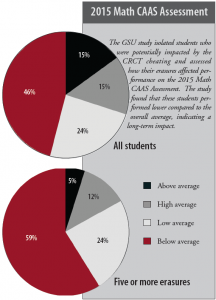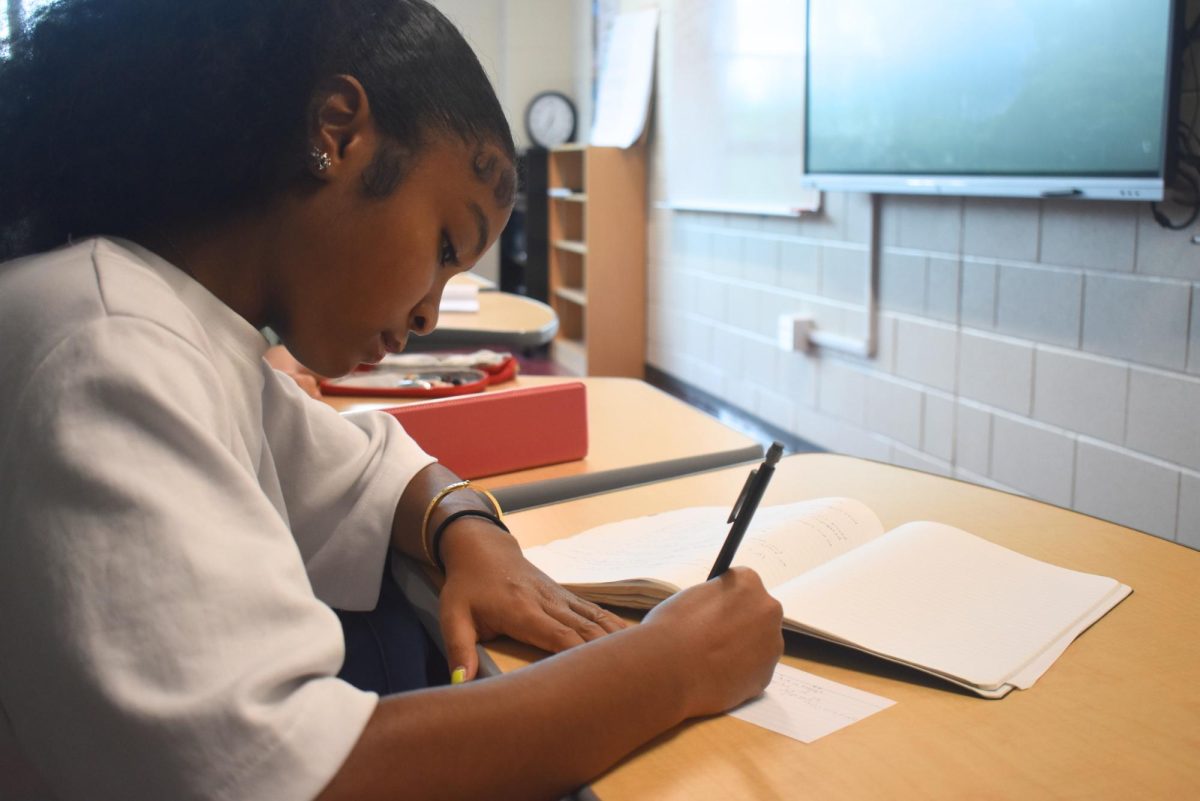Six years after the cheating scandal that shook Atlanta Public Schools, the full impact on students whose scores were altered is now coming to light. Georgia State University published a study earlier this year that investigated the long-term effects on students affected by the scandal. In response to its findings, APS is beginning to implement intervention programs to ensure that these students’ needs are met.
The study identified tests with at least five wrong-to-right erasures as irregularities. This indicated that a teacher had likely altered the answers. Using this method, the authors identified 7,046 students whose tests were likely manipulated. They then analyzed the lasting consequences on these students by looking at their more recent standardized test scores.
According to APS CRCT remediation committee member Shawnna Hayes-Tavares, long-term deficiencies in student achievement can be attributed to poor teaching at the time of the CRCT scandal.
“We have to believe that some of the reason why the schools are now on a failing list is because those students weren’t t aught properly,” Hayes-Tavares said. “If the teachers felt confident that they were teaching, then they would not have felt the need to cheat.”
aught properly,” Hayes-Tavares said. “If the teachers felt confident that they were teaching, then they would not have felt the need to cheat.”
The findings indicated that the largest impact was on students who were in the first or second grades when the cheating occurred.
The study considered the impact on students’ achievement in mathematics moderate, estimating that the amount of education loss was equivalent to having a first-year teacher in an advanced class.
The effects were the largest in Reading and English Language Arts. In these subjects, the cost of the cheating was estimated between one fourth to one half of the average annual achievement gain for a middle school student.
Additionally, the cheating scandal could have brought about a long-term impact by causing students to believe that they had a greater skill level based on their CRCT scores.
“Children who are cheated and given a false sense of security as it relates to their achievement can be impacted, particularly when they get to higher levels when [the curriculum] is more difficult,” Hayes-Tavares said.
While APS has offered intervention programs in previous years, the district could cater only to skill-deficient students and not specifically to victims of the cheating as those students had not been concretely identified to be impacted.
“The district guidelines said that they would enroll students in support classes who had the lowest 35 percent of students on the 8th Grade CRCT, and that’s how the district, starting last year, set up enrollment in those classes,” Student Support Team Coordinator Susan Ramsay said.
Programs offered include online curriculum recovery, an expansion of credit recovery, an increase in Atlanta Virtual Academy and implementation of dropout recovery plans. In addition, the district offered Accelerated Intervention Plans consisting of school day programs, after-school enrichment, a Saturday Academy and parent workshops. Many of these programs have been utilized not only for recovery, but for courses in advanced classes.
Now that the district has identified those students possibly affected, school officials are working to effectively target those in need of assistance to ensure that their needs are met. However, not every student who was identified as potentially impacted necessarily has skill deficits in academic achievement. It is possible that a student could have altered their answers more than five times without teacher intervention. According to teachers at Grady, this has raised concern over the effectiveness of the targeting of learning opportunities.
Because the academic progress of students varies on a case-by-case basis, the needs of the students will be assessed through Individual Learning Programs which will attempt to identify the individual needs of the students. These programs will help support the victims through graduation by providing remedial assistance based on the student’s individual academic progress.
“Individual learning teams will put together Individual Learning Plans, where they will look at the individual needs and academic goals as it relates to that child and see what type of strategies are in place that they can put in to support that child,” Hayes-Tavares said.
In Individual Learning Plans, parents are encouraged to meet with advisors and review the academic progress of their children. Students who are on track may not need intervention programs or may be offered SAT and ACT preperation classes.
At Grady, there are a number of students who have been impacted by the cheating scandal and are seeking remedial assistance. The incident, however, has a more limited effect at Grady than other schools in the district.
“There are 60 students at Grady that have been identified as potentially impacted in ninth through 12th grade,” Ramsay said. “In comparison, Mays High School has about 400 identified students … In the grand scheme of things, Grady has a lower impact than most other schools.”
Currently, Grady is working to implement reading and math support classes to assist impacted students. Academic remediation programs will include courses in reading, ELA and mathematics, as well as flexible learning periods. These programs will be modeled based on services that have already been established to assist students with skill-deficits in general.
“District-wide, the services of each school offered might vary a little bit, but the Individual Learning Plans at Grady are set up using the programs that Grady has in place, such as the math and reading support classes,” Ramsay said.
While progress has been made to assist the needs of the impacted students, school staff are still waiting to receive a response from the district to determine which students at Grady were impacted by the cheating. This has delayed efforts to implement remedial programs.
“My understanding is that we haven’t received all of the data,” Grady U.S. History teacher Roderick Pope said. “It has not been compiled yet, so we’re waiting.”
Aside from identifying the students who could have been impacted from the cheating, the implemenation of the Individual Learning Plans will be a difficult task to execute, and a significant amount of progress still needs to be made. APS is aiming to complete the Indivudual Learning Plan meetings by the end of the first semester of this year. However, based on Hayes-Tavares’s concerns, it will be difficult for APS to timely execute this goal.
“Even though it sounds great and I want to say they’re in the right movement and process for getting there, we still have a ways to go,” Hayes-Tavares said. “Identifying the students is one thing — putting together 3,500 individual learning plans is another issue.”
Another concern regarding implementation is that it will be challenging to address the learning deficiencies of impacted students. Because it has taken five years for APS to identify the potentially-impacted students, there is a large gap of achievement that the educators will have to address.
“What we could have corrected, maybe a smaller gap four or five years ago, could potentially now be a much larger gap,” Hayes-Tavares said. “In my opinion, they did not respond quickly enough and let our children know that cheating them would not be tolerated.”







